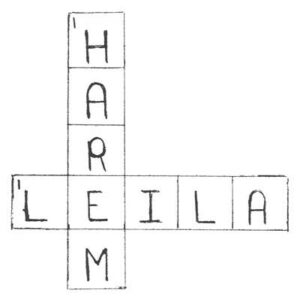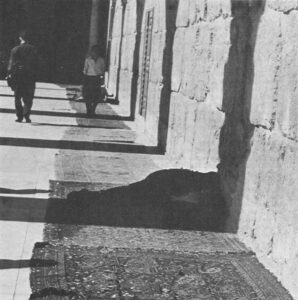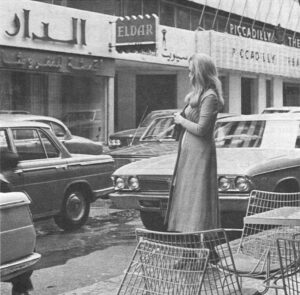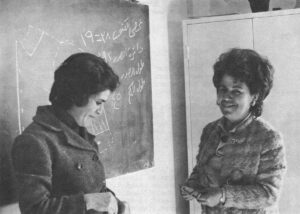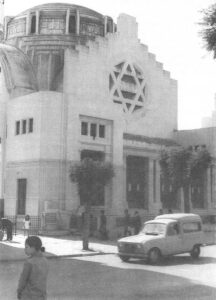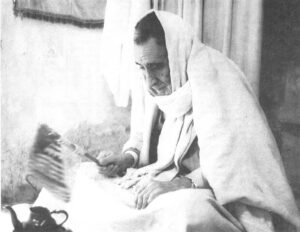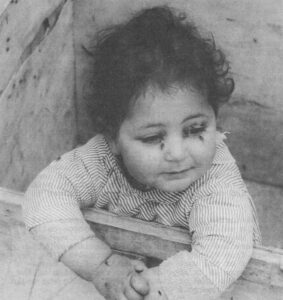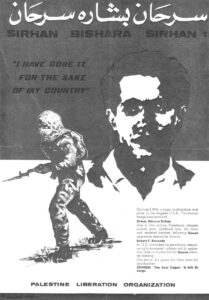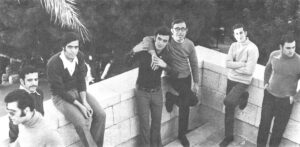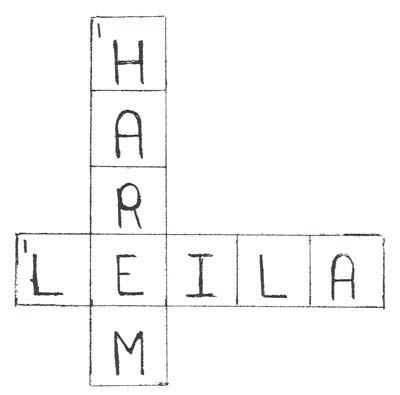
Number one across: the Arab woman best known to the West today whose name is often associated with trouble.
Number one down: one of the best known Arabic words in the English language referring to that part of the house allotted to females and also referring to the wives, concubines, or other females occupying the woman's sector of the house.
The Answers: Leila Harem (Khaled)
How do these two words fit together other than in this crossword puzzle? Figuratively speaking they spell a puzzling new breed of Arab women. Harem evokes the old image of the submissive and veiled Arab woman. Leila Khaled is not veiled and emphatically not submissive. She is the two-time (once successful) skyjacker for the Popular Front for the Liberation of Palestine (PFLP).
This is the point: With Leila Khaled’s help PFLP commandos not only touched off the September fighting in Jordan but they have also lighted a slow-burning fuse under the harems and the traditions confining women in the Arab World. Some of the Palestinian activists discuss the new attitude toward women emerging in the Arab World:
- “The first problem of women is men…who look at women…as for pleasure, a doll, piece of furniture, and a slave in agricultural society,” declared the thirtiesh, handsome, and volatile PFLP spokesman Ghassan Kanafani.
- “Dogmatic habits of oriental life which regard a woman as a disabled or sub-abled creature” are the culprit, announced Fateh spokesman Sufian alAzam, a Damascene with a British accent.
- “The presence of any woman in society was a sexual presence; now she’s becoming a human being equal to man,” reports Mona Saudi, twenty-five year old PFLP woman activist.
Two Battles
The popular Front for the Liberation of Palestine aims to liberate Arab society from male chauvinism 1 at the same time that it liberates Palestine from Israel. It attacks “the governing reactionary cultures and rotten habits, the cultures and habits of religion, tribal, feudalist ideas which insist…on enclosing a woman…to restrict and isolate her.” Marxist PFLP touches all bases “scientifically” denouncing in one society at one historical stage not only its feudal order but also its bourgeois elements. “The environment [is] dominated by the culture of the ruling class, which is influenced…by the Western pattern of evolution of bourgeois society based on the values of consumption [sic].
In other words says PFLP ideologue Kanafani, “Gals in slacks running around on Hamra [Beirut’s chic shopping and cafe district] imitating Hollywood film styles and without real political education have a false freedom like the freedom of girls in short skirts and cosmetics in Hong Kong…They continue [to be] slaves; the difference is they were less sophisticated before.” Kanafani illustrates: “A telephone operator spends on dresses and not education, goes to stereo clubs, and discovers her money is still not enough. She starts going with men for money. Her step toward false freedom has led to prostitution.”
The PFLP’s solution is “to destroy and rebuild a revolutionary society.” In Leila Khaled’s scheme women must fight two battles: one against Zionism and Israel and the other “against man and the ideas that he practices on the woman. At the same time that she meets the enemy she frees herself.”
Women In War
In their battle against Zionism fedaiyat (feminine plural of fedayeen meaning one who sacrifices and referring to commandos) are reportedly better snipers and markswomen and better at making mines, keeping secrets, and making contacts. In addition reports Kanafani, “Women are the best people in facing Israeli tortures.”
Why are women so effective? Mona Saudi, who accompanied one of the PFLP skyjacked planes on its last trip from Beirut to Dawson Field, Jordan, where the plane was blown up in September, believes that women-are more devoted. “Most men are concerned with political revolution. Then by education on the front they realize it should be a social revolution. But women who have been oppressed feel the problem more so they can act and take a position according to their feelings.”
Miss Khaled further believes that women make good fighters because they also try harder “to prove they can do the same thing as men and more.” Kanafani agrees with her that “girls are tougher than men” because they must continually prove themselves. He relates how “once a fedaiya found a snake and threw it on a male comrade who ran away. If she had seen the snake and run, the men would have taunted her as a typically weak and scared female.”
Training
Officials like one chubby Fateh spokesman assert that “if you don’t use women, you are cutting down your capabilities by one-half.” And revisionist commando historians rush to show reporters pictures of Palestinian women shouldering rifles during the 1936 rebellion in Palestine. But women today – as in 1936 – are almost militarily irrelevant except for sabotage or skyjacking which requires no commando training and which is limited to the smaller EFLP group. Leila Khaled never held a gun until right before her first skyjack on August 29, 1969.
Fateh, the largest and most popular commando group, had a glut of male volunteers, which it has been training before instructing girls. It uses women to care for children of “martyrs” (dead commandos), collect money, and administer first aid.” According to Fateh spokesman alAzm,
We haven’t reached a point that we can say women are being organized…The Jordan fighting did speed it up. But most of them would be in the militia, which includes both sexes because it’s very easy. A militiaman is one who stays in the village or camp town and the only difference between him and another citizen is that he’s been trained and has a gun.
The Zaharat (Flowers) is supposedly the paramilitary corps for schoolgirls. But alAzm told its real purpose. It is not primarily to teach girls things like judo while the schoolboys in Lion Cubs (Ashbal) learn karate. Membership in Zaharat is actually a bribe to study.
The schools in the camp are operated by UNRWA [United Nations Relief and Works Agency]. Places are limited especially after the sixth grade when there are two shifts a day and the students spend only about three hours in school. They fail. [So] we give them lessons regularly. And to make them come we say “Come and have military training” since they regard the commando as the highest symbol.
According to alAzm a few women were trained, but because “the women kept bothering the fighters. There were not supposed to be co-ed camps. On many occasions the girls would snow up and want to be trained.” AlAzm adds, “physically they are below the average man…So they have newly devised training methods especially for them…Their training emphasizes things you can do when you are not at the front lines” – like communications.
A Fateh spokeswoman whose nom de guerre is Samiha takes exception with the analysis of her male comrade. She emphasizes the equality in training for men and women including “swimming, bomb making, crossing fire, specializations for example in rockets, and of course first aid.” She continues, “Like the militia they have learned to fight and defend themselves usually with grenades and American guns or the Russian automatic rifles, Klashinkovs.11 (Fedaiyat should feel at home with a Klashinkov which they say is named after its woman inventor Klara Shinkov.)
Samiha concedes only minor differences in the program for women. At the first session there is “a discussion of sexual relations telling them very frankly about needs and drives.” She explained, “Here in our culture especially in Jordan women are less educated than men especially sexually speaking. There is little frank discussion between mother and child.” They [the trainers] try to educate her. They try not to ignore this aspect.”
“Girls who went away for training come back healthier, stronger, and heavier,” added Samiha, who has an air of Audrey Hepburn frailty and who regrets that low blood pressure rules out such bodybuilding activity for her.
Fedaiyat have changed appearance in other ways too. Dr. (medical) Nabilah Budny, a Palestinian-American who worked with the guerrillas during the September clashes in Jordan, claims that she “can recognize them [fedaiyat] by their cleaner more purposeful type of a look.”
There are fedaiya fashions too. During the fighting the girls reportedly wore kufiyas [the Arab headdress which today is standard commando gear] and khaki trousers and were indistinguishable from the men. But when transporting ammunition or spotting Jordanian army positions, they wore peasant dress to pass as innocent citizens.
Dr. Budny and Samiha both believe that guerrilla girls’ attitudes have changed with their fashions. Samiha claims that basically “girls don’t talk any more about boys or dresses.” And Dr. Budny expresses her preference for a fedaiya to an average Arab middle class girl who thinks about “dresses, parties, marriage with money and position and love, but most important – money and position.” Wearing a perfectly fitting workshirt and blue jeans for her interview, Dr. Budny insisted, “I never heard a fedaiya being sarcastic about someone’s dress. They were too busy in projects or thinking about the Palestine movement.”
Consensus among commandos is that indeed women leaving the confines of their homes to fight or just to tend commando children gain new contacts, experience, and self-confidence. However actually before becoming fedaiyat these girls undergo a prior self-selection process. Having overcome parental and social obstacles against female self-assertion, they are exceptional among Arab women. And compared to the average male fighter, they have stronger, more determined personalities.
Women In Psych War
Leila Khaled earlier spoke of the woman fighting her political enemy Israel at the same time that she battles “man and the ideas that he practices on the woman.” it is this latter psychological warfare which may have the more profound immediate effect on Arab society today. 3
“First she has to break the authority of her parents,” says Dr. Nabilah Budny. And “the lower the class becomes, the more conservative and puritanical the attitudes are.” Most guerrillas are refugees, the poorest segment of the Palestinian population. Moreover the majority of Palestinians are Muslims, who are generally more conservative than the Christian minority. Families in the occupied territory of the West Bank live even more traditional lives in their ancestral homeland, which they did not abandon. 4
PFLP activist Mona Saudi describes her family life in Jordan to illustrate the obstacles facing girls desirous of change;
If I wanted to go for a walk or stay late at the library, I couldn’t…In Amman no girl can go out alone at dark…To meet the opposite sex is completely forbidden….
My brothers could go and come any time. They didn’t have to do work at home. If I were sitting in a room with one of my brothers, he could ask me to get him a glass of water and I would be expected to do it. But know I could never ask him to.
If I did what my father – who is a very religious man and who is seventy-five years old, fifty years older than me – wanted, I wouldn’t have finished secondary school, college, left home, or traveled. The most my father would have imagined for me was to be a teacher going to school in the morning, coming home at night, and waiting to get married.
Mona speaks of her father resentfully though respectfully while she refers to her mother lovingly – attitudes to be expected of a Western educated girl kept in a sexually segregated society 5 . Mona’s mother was married at age twelve. Mona’s eldest sister who at age forty cannot read a newspaper was married at fifteen “without challenging the marriage.” After seven years of school the next sister at age fourteen “refused but was obliged to marry one of her relatives – no love relationship.” But the sister closest to Mona’s age was able to choose her husband because, says Mona, she became economically independent working as a radio announcer. (Her father objected to the job because he believed his daughter should not broadcast her voice to strangers.
Mona went to Paris at age eighteen without parental permission. She studied art – a convenient, auto-liberating first step for Arab women. Today Mona is independent by any standard. Dressed for Harvard Square in baggy, brown sweater and slacks and with short, unkempt, light brown hair tumbling over thick lens, horn-rimmed glasses, Mona is often seen in Beirut’s Hamra Street cafes at night when few females go out unescorted.
Mona- who was jailed one month last year in Copenhagen on charges that she was plotting to assassinate ex-Prime Minister of Israel David Ben Gurion- considers her life as an Arab woman “extraordinary.” “In the whole society it is not accepted.” Gesturing with giant, manly hands, she says that Palestine Liberation, the Arab cause celebre, is easing the way out of father’s house for many girls. “Any ordinary case can be liberated by the revolution…Any family would let a daughter go out for the reason of revolution but would not for any other reason…Now if a father hears a radio broadcast about Leila Khaled he might say to his daughter, “You couldn’t do like Leila.’ But the daughter will reply, ‘Yes, I can but you don’t let me.'”
A guerilla girl develops something like a split personality. She is independent, dominant, and businesslike in revolutionary activities. In personal affairs she in general remains a traditionalist. PFLP spokesman Kanafani’s cousin for example “learned from political activities and training how to depend on herself. And she doesn’t need her family now as an economic shelter. [The commandos Fateh much more so than PFLP – spend large sums of money supporting their faithful.] But the fighter’s sisters still call her a spinster because she is twenty-one and not yet married.”
And even girls escaping male domination in their families still find themselves in commando groups struggling to be free from male chauvinism. Mona Saudi discovered, “In the beginning of the Palestine Revolution men would refuse women’s participation in man’s work more out of politeness. Men considered women weak and their responsibility.”
Dr. Nabilah Budny reported, “There used to be a problem of even getting together in the same room…It’s hard for men to accept women participating in life of a camp – a mixed life. There is a feeling that you can’t have relations with women out of marriage. But this happens normally. First there were separate camps for training but all came together for meetings…There is still a very puritanical relationship between men and women although they in fact slept in the same room the fourteen days of the Jordan crisis. But when it comes to sexual relations you have to be married or something like that.
Daredevil Leila Khaled confides “I didn’t break every tradition in my life as an Arab woman…A girl in Paris goes maybe every night to any apartment with a friend. Here I can’t do it. First of all, I can’t accept that. I didn’t grow up that way…I haven’t changed my traditions.” She realizes that “society would accept if I went on a mission with a man” but in “my daily life I can’t do that. In daily life, if they see me going every day in Hamra Street or Rouche [Beirut’s entertainment districts] with a man – not a relative 6 – on my arm they won’t accept it.” And it follows in her mind apparently that if society won’t accept such behavior then she cannot either.
![When Leila Khaled described the gulf between her traditional, personal life and revolutionary existence, she spoke in terms of clothes. The petite skyjacker explained, "I wouldn't go to the camp [refugee] dressed as I am now" - in a blue, black and lilac stripped pants outfit with a blue turtleneck sweater, matching blue shoes, and a "Beatles" cap (not pictured) worn over short, dark, naturally wavy hair parted over the right eye.](https://aliciapatterson.org/wp-content/uploads/2023/05/Stern_Puzzling02-768x1095.jpg)
Leila Khaled said she “gave up everything – all social life”, to prepare for her sabotage missions and never imagined that she would “get married through the revolution.” “But through experiences and sharing in armed struggle, I changed my mind. It’s unscientific to say ‘I’m not going to get married.’ …It doesn’t fit with human nature…Revolution is not just for single people.” Leila expects her marriage however to set a “revolutionary example.” She will have neither house, children (“in this stage”), nor conventional housewife duties. “We are not ordinary people,” she says. But she and her husband, fellow commando Bassem (His last name is kept secret.), are “giving the society some symbols – actual individuals, who are kicking the harem habit.
Compared to the forty million Arab women in the world, Leila Khaled and the fedaiyat are outnumbered by those with a harem mentality. Actually only a small number Of Arab women are Palestinian, and a very few of them are activists, and even fewer are commandos. Moreover even some of the fighting women may grow tired of battle garb and trade in their Klashinkovs for the latest in shoulder bags.
Miss Khaled’s PFLP comrade Kanafani, however, relates some slight signs of a new breed of Arab woman: Everyday on her way to the PFLP cadre school in Jordan, a girl wearing fatigues and a machine gun slung over her shoulder used to walk past six men working in a field. The men would stop, watch her, and shout, “I pray God will safeguard your body” – a customary reassurance told an unaccompanied female among male strangers. One day the girl hearing the men yelling to her once too often Jumped over the fence into the field, prepared her machine gun, and ordered “Put your hands up and beg me not to shoot you. I can protect my body myself.”
No doubt she offended the six. But other men like one Fateh spokesman approve of this woman’s lib fedaiyat style; “From all points of view, it’s a benefit.” The spokesman then paused and added, “A benefit for all – except for those who like harem.”
Received in New York on June 24, 1971.
©1971 Paula Stern
Paula Stern, a free-lance writer, is an Alicia Patterson Fund award winner. This article may be published with credit to Miss Stern and the Alicia Patterson Fund.
End Notes
PFLP speaks the same language – terms like “male chauvinism” – as the Western audience to which it addresses its social revolutionary rhetoric.
Miss Khaled told me – her purplish lips barely moving – that a report that she had had a facelift was a Zionist lie and that a friend observing our interview was joking when he said that she had “changed her face,” which has a scar on the bridge of the nose and make-up free, olive complexioned skin stretching tightly across pronounced cheekbones.
In the Arab world (or, for that matter, the entire Mediterranean region) female sexual honor (‘ird) and the general concept of honor (sharaf) govern social relations. Honor is a constant preoccupation in small scale, exclusive societies where face to face, personal, not anonymous relations prevail. The patrilinear family, the basic unit of Arab society, is cemented together by a sense of collective honor, which is defended according to a sexual division of labor.
A woman’s honor derives from her sexual purity or modesty; her paramount virtue should be sexual shame. Since honor is something imputed by others she can never retreat from a bad reputation into her own conscience.
The man is responsible for guarding the ‘ird of his womenfolk who are assumed to be too morally weak to guard themselves. To protect women the men restrict them to the house, the haram. The woman comes to dominate her household. But that is the extent of her universe. Her horizons stop at the front door. She is practically under house arrest.
The result today is a two-tract society, each sex having a different set of values and modes of behavior. Femininity is a passive, negative reflection of male domination. A baby girl is a potential family liability because of ‘ird which she can always lose but never regain. She is less educated than her brothers who through male achievements can augment family sharaf. Her family marries her off at an early age to the house of another man who assumes the responsibility for guarding her sexual honor. She only partially compensates for her sexual-social inferiority by bearing a son.
Palestinian women who were uprooted from their homes two decades ago are less affected by these mores. But these transitional women caught between a traditional heritage and new Western ideas suffer most from “guilt neuroses,” the female, psychological ailment which Lebanese psychiatrist Dr. Edouard Azouri diagnoses most frequently. He explains that leaving their home life in Palestine so abruptly left them no time to adjust to a new, anxious, and confusing sexual freedom.
Leila Khaled credits her mother as the major influence on her personality; she mentions her father only as a second thought.
Male relatives are exempt from this ban. Since they are responsible for guarding the sexual purity of women in their family, they are safe escorts.
Received in New York on June 24, 1971.
©1971 Paula Stern
Paula Stern, a free-lance writer, is an Alicia Patterson Fund award winner. This article may be published with credit to Ms. Stern and the Alicia Patterson Fund.

